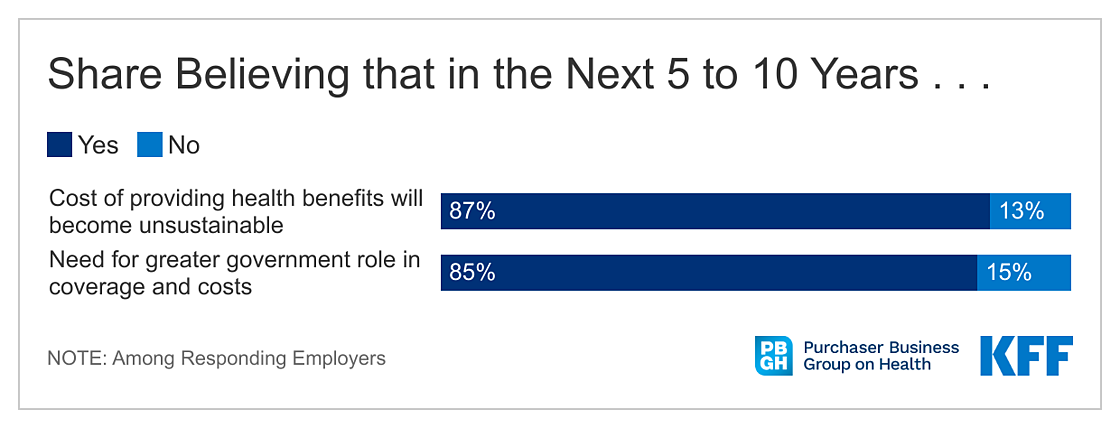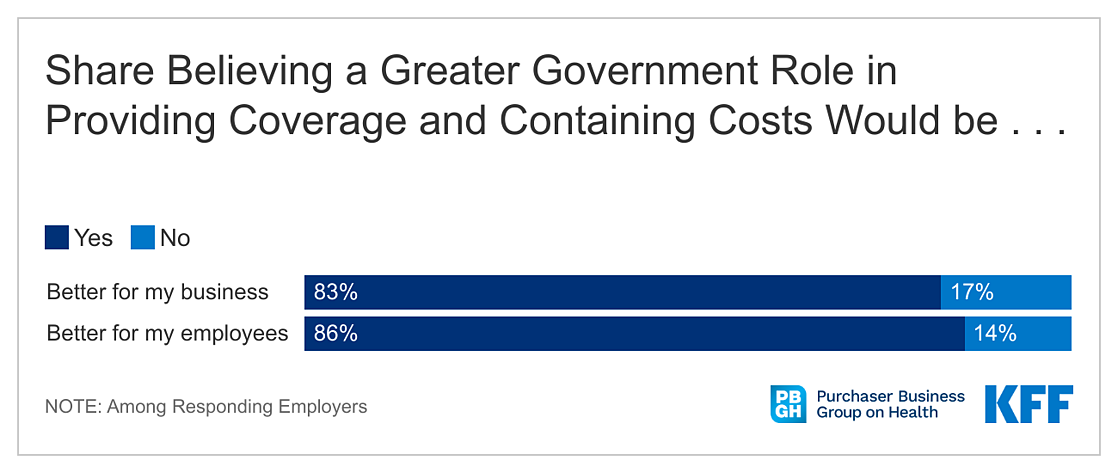[ad_1]
Executives from nearly 90% of large employers surveyed believe the cost of providing employee health benefits will become unsustainable over the next five to ten years, and 85% expect the government to be forced to step in to address it. provide coverage and contain costs, according to a new survey released today by the Buyer Business Group on Health (PBGH) and KFF (Kaiser Family Foundation), with support from the West Health Institute.
Research exposes growing concerns from large employers about the future of employer-sponsored coverage, with 87% of respondents saying they believe the cost of employee health benefits will become unsustainable in the next five to 10 years. .
More than 300 executive decision-makers from companies with more than 5,000 employees responded to the survey in December 2020 and January 2021. The survey report was released today ahead of a web-based briefing jointly hosted by PBGH and KFF examining the views of business leaders on health policy.
“This poll highlights what we have understood for some time: the current healthcare system is on an unsustainable path,” said Elizabeth Mitchell, President and CEO of PBGH. “Our large employer members are competitive and prefer market solutions. But they have reached their limit; they are tired of pouring tons of money into a failed healthcare market that offers uneven quality at outrageous costs.
Annual family premiums for employer-sponsored health insurance reached $ 21,342 in 2020, up 55% from 2010 and increased at a rate at least twice that of wages (27%) and inflation (19%). During the same period, the average deductible for a single employee fell from $ 917 to $ 1,644 among workers with a deductible.
Employer health plans already pay much higher prices for health goods and services than public plans: Hospitals across the country charge employers and private insurance companies an average of 2.5 times what they pay. they receive Medicare for the same care, and three or more times Medicare prices in half a dozen states.
“Any effort to expand public coverage options or restrict prices will face strong opposition from the healthcare industry,” said Larry Levitt, executive vice president of health policy at KFF and author of the report. “Employers, who pay a large chunk of the nation’s health care bill, could be a powerful counterweight.”
“Soaring health care costs pose a significant threat to the prosperity of American businesses and workers. Every additional dollar spent on health care is a dollar less available for salaries, investments and other essential business expenses, ”said Shelley Lyford, President and CEO of West Health.
“Employers are getting a rough deal and they must use their collective power in Washington to inspire action by lawmakers – especially at a time when the economy is reeling from a pandemic.”
Some of the main takeaways from the PBGH-KFF-West health survey:
Four in five respondents (87%) believe that the cost of health care services will become unsustainable over the next five to ten years.

85% of respondents said government will need to play a greater role in providing health care coverage and containing costs over the next five to ten years; 83% said such actions would be better for their business and 86% said such actions would be better for their employees.

92% of respondents believe that policymakers should pursue policies that strengthen antitrust enforcement and prohibit anti-competitive behavior on the part of suppliers, pharmaceutical manufacturers and health plans; 90% would support actions improving price transparency and the total cost of care.
Over a third of respondents somewhat or strongly agreed with government policies that would cap hospital prices in markets where competition is little or no competition; limit the prices charged by non-network suppliers; and negotiating the prices of high-cost single-source drugs or setting limits on drug price increases.
Relatively few respondents generally disagreed with proposals that would lower the age of Medicare eligibility to 60 or create a new option for public plan coverage, either for their own employees or for the general public. This lack of disagreement may reflect the lack of details on how these options might ultimately play out, but employers nonetheless seem open to extending public coverage options to more people, including their own employees.
Mitchell of PBGH concluded: “Clearly, there has been a consensus among those paying the bills that the healthcare industry does not take the impact of rising costs seriously enough. better quality health care.
The KFF-PBGH survey was conducted between December 2020 and January 2021 by Beresford Research in partnership with the Gary and Mary West Health Institute (West Health). The telephone survey was designed by researchers at KFF, PBGH and Beresford Research, and was based on a convenience-of-opinion sample of representatives from 302 employers with 5,000 or more employees. Responding organizations were broadly distributed by region and industry. Individual respondents included general managers, operational managers, human resources managers or people directly reporting to these positions. Follow-up conversations were conducted with 10 of the respondents to gain additional information and insight.
About the Health Buyer Business Group. PBGH is a nonprofit coalition representing nearly 40 private employers and public entities across the United States that collectively spend $ 100 billion a year to purchase health care services for more than 15 million Americans and their families. In partnership with large employers and other healthcare buyers, PBGH initiatives are designed to test innovative operational programs and scale up successful approaches that reduce healthcare costs and improve quality through United States.
About KFF. Filling the need for reliable information on national health issues, KFF (Kaiser Family Foundation) is a nonprofit organization based in San Francisco, California.
About Santé Ouest. Funded only by philanthropists Gary and Mary West, West Health is a family of nonprofit and non-partisan organizations, including the Gary and Mary West Foundation and the Gary and Mary West Health Institute in San Diego, and the Gary and Mary West Health Policy Center in Washington, DC West Health is committed to reducing healthcare costs to enable seniors to age well in their homes with access to high-quality, affordable health and support services that preserve and protect their dignity, quality of life and independence. Learn more at westhealth.org and follow @westhealth.
[ad_2]

